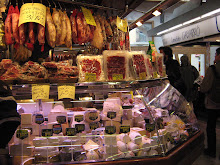I grew up in the Age of Wonder. Bread. It was truly wondrous, especially in the way it could mimic the dental moulding paste the orthodontist used. Equally fascinating were the compartments of Swanson’s frozen dinners, the Hostess Cupcake with its peel-off frosting and the drink of astronauts, TANG. Lest this start sounding like free advertising for the giants of prepared foods, I say all this because this is what we were eating in the 1960s. And, let me tell you: I wanted it. I even came home one day after being at a friend’s house and asked my mom to make me hamburger stew (hamburger combined with one package of Bird’s Eye frozen mixed veggies). I wanted it because, even though I grew up in a tract house in suburbia, I didn’t grow up in the house where hamburger stew was served.
I grew up in the house where bitter melon was growing in the backyard and dried salted fish was perfuming the garage (quite malordorously on those 100+ degree summer days). My mother is Chinese. There is no such thing as a prepared food outside of a restaurant. There are preserved mustard greens and dried scallops and oyster sauce but no “prepared foods.” Not in those days. For my mother, food is connection--to your history, to your culture, to your family. How on earth could your meal be prepared by a machine or in a factory? What would that make you?
It would make you an orphan.
I learned quickly that cooking was the way you connected to people. You couldn’t be a slapdash cook who didn’t care for the process or what was on the plate. But equally, your food didn’t always have to come out perfectly. That said, I admit to feeling pretty crappy when I do cook a meal and something is too dry, too salty or just… underwhelming. I feel like I haven’t said “I love you,” the right way.
I know now that when I cook an old favorite, I am saying to my eaters, “I know you and want to give you what you love.” When I make a Persian quince and lamb stew or a tartiflette from Alsace, I bring the world into my home and, I hope, arouse not only tastebuds but an incipient understanding of someone else’s reality. Perhaps my most recent lesson is that when I cook something I have never cooked before, I connect to my own vulnerability and put it out there for others.
My mother is now 82, and my aunt who lives with my parents is 88. The traditional greeting in Cantonese is “Sihk jaw fahn, mei ah?” Have you eaten yet? In their age, they do not have the stamina they once had for cooking. So they ask instead, “What do you want to eat today?” and we go off for Korean bbq or an Indian thali or hummus schwarma that they have determined to be “the best,” and we connect to one another and to the world. With a slurp, a chew, a sip, we say what we cannot use words for.
Friday, August 20, 2010
Subscribe to:
Post Comments (Atom)

No comments:
Post a Comment